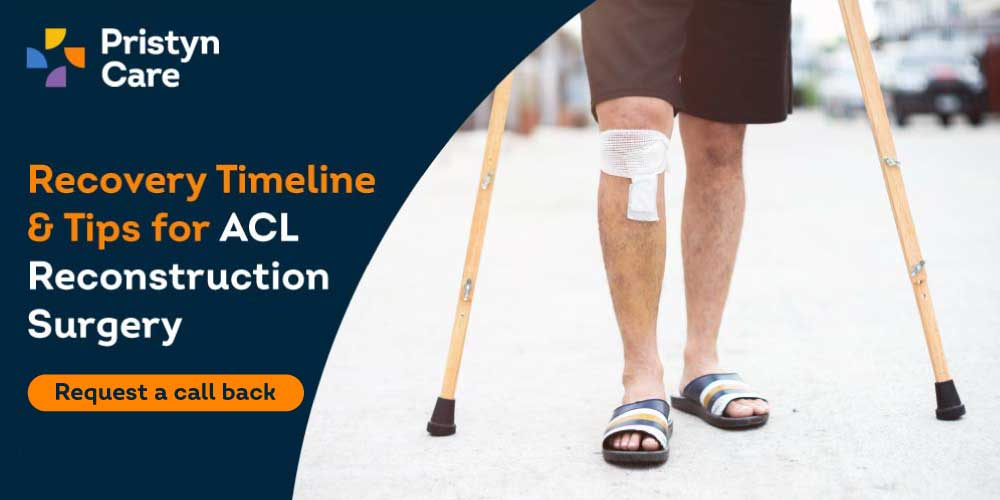
Once you’ve undergone an ACL Surgery, the next part is recovery. Normally, the ACL surgery recovery time for complete tears is over 6 months, but partial ACL tear recovery time is usually less, i.e., around 2-6 months. Complete recovery of an ACL tear may take around 9 months, but most people resume normal lives in 6 months, and athletes can begin sports in about 8 months. In the given blog, you will find a brief overview of the ACL surgery recovery, timeline, etc.
Table of Contents
ACL tear surgery recovery timeline
A rough timeline of ACL reconstruction surgery recovery is given below:
Phase I: First two weeks after the surgery
This is the most crucial time for recovery, as your body is still vulnerable due to the aftermath of the surgery. The muscles, ligaments, graft tissue, and other body tissues are still inflamed, and you will experience pain, swelling, and fluid buildup in the joint at this time.
Your rehabilitation process will begin right after the surgery to encourage healing. The joint is still weak at this time and can’t hold too much weight, so you will have to use crutches for at least 10-14 days.
During this time, you should:
- elevate your leg and apply cold compresses every 2 hours.
- practice knee flexion and extension by placing the leg on the edge of a chair or bed, and propping the heel on a solid surface, respectively.
- have gait training to prepare yourself for the removal of your crutches.
Phase II: 2-6 weeks after the surgery
During this time, you will be able to stand without assistance/crutches, but your knee activity will be limited. Most patients can also resume driving during this period, but you should wear a knee brace to protect your knee from unnecessary stress.
During this time, you should:
- perform walking exercises for 15-20 minute intervals.
- perform leg strengthening exercises, like squats, leg presses, and hamstring curls
- add bicycle and elliptical training at this time if approved by your physiotherapist.
Phase III: 6-12 weeks (3 months) after the surgery
During this period, your knee will continue getting stronger, and you will be able to start performing low-impact activities like cycling, swimming, and rowing. By the end of this period, you will be able to handle light running and jogging easily.
At this time, you should follow the given rehabilitation tips:
- start lateral exercises like lunges and side steps.
- do flutter-style swimming strokes, but avoid cutting or pivoting motions.
- continue performing strengthening exercises, and start sports-specific training.
Also Read- Non Surgical Treatment and Management of ACL tears
Phase IV: 3-6 months after the surgery
This period is crucial for athletes, as they can properly restart their sports training. Proper rehabilitation and training at this time can help prevent re-injury in the future. You should not skip a knee brace during this time, even for low-impact activities. By the end of the 6-month mark, the tissues are almost fully healed, but most PTs recommend that patients continue using supportive braces and their physiotherapy during this period.
At this time, you should:
- start running, jumping, and agility training.
- start performing single-leg plyometric exercises.
Phase V: 6 months after the surgery
This phase of recovery is usually only recorded among athletes and can last for 2-3 months. During this period, the patient returns to their sports and resumes full joint function. They should have no soft tissue or range of motion complaints at this time.
During this period, you should:
- maintain strength, endurance, and proprioception exercises.
- use functional braces, if necessary.
Also Read- What should you do for knee ligament and meniscus injuries
Tips for ACL Tear Recovery
- Be patient with your physical therapy. Do not push your body beyond its limits, as doing too much too soon will not only halt the recovery process but may actively damage the joint.
- Follow your physiotherapist’s instructions carefully, especially when it comes to adding new exercises and movements to your physiotherapy routine.
- Discuss the use of cold therapy during the recovery to help recover from inflammation after your physiotherapy sessions.
- Make sure you are getting enough sleep and nutrition. Aim for at least 7 hours of sleep every night, and eat a diet rich in protein, dairy, fruits, and vegetables.
Also Read- Different Types of Knee Replacement Implants and their Advantages.







